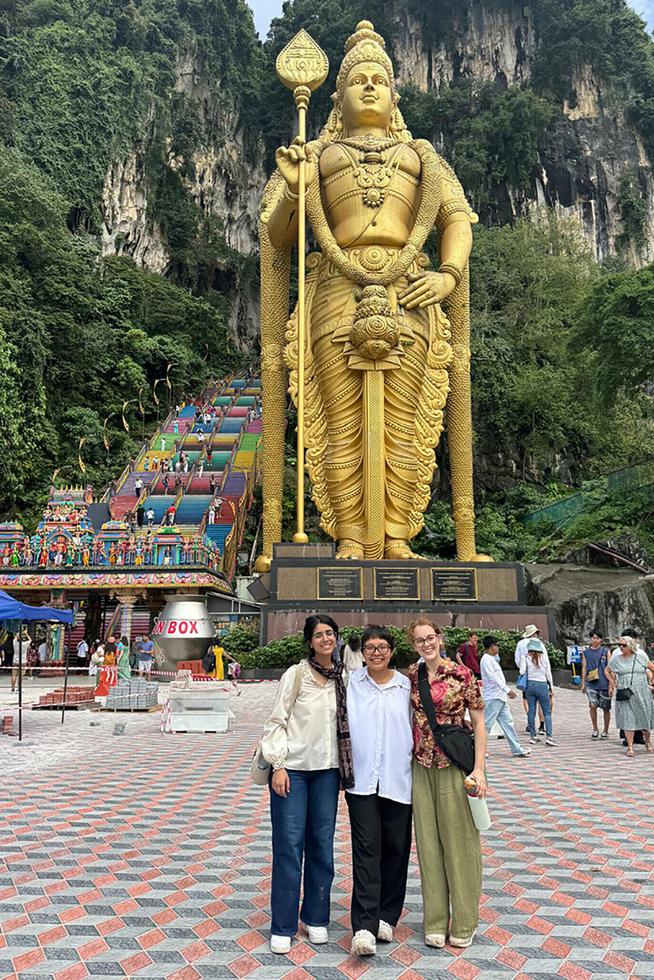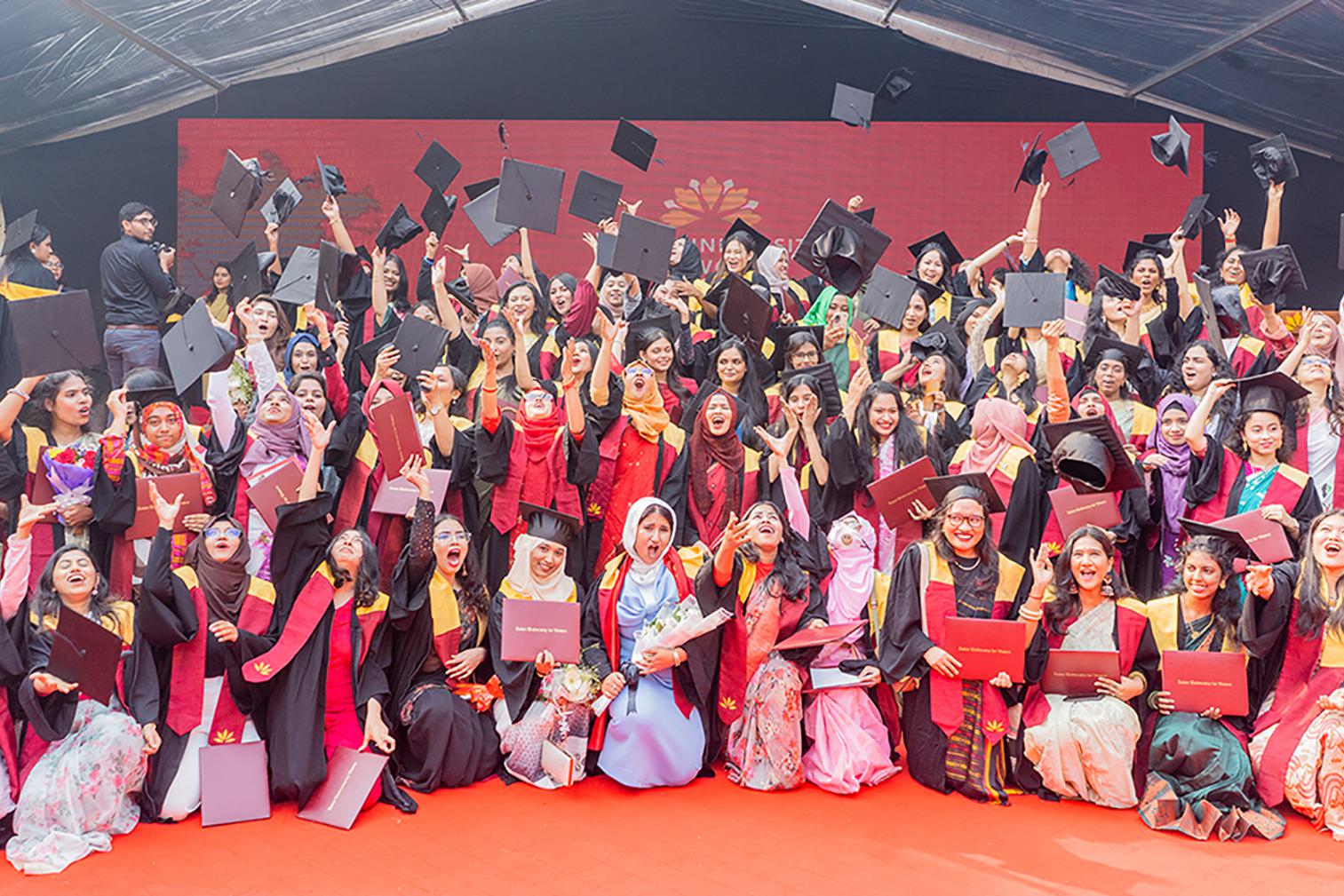Rozey Hill ’23 was the first Wellesley alum to become a teaching fellow at the Asian University for Women (AUW) in Chittagong, Bangladesh, where she educated and bonded with students from a variety of backgrounds, countries, religions, and experiences. Now that her time as a fellow is complete, she says of her former students, “I’ll always be carrying a part of them with me.”
AUW opened its doors in 2008 to provide access to higher education to women from across Asia, including refugees from conflict areas like Afghanistan.
“You create an ethos where they have the highest ambition possible of what they can do with their life,” says AUW founder and CEO Kamal Ahmad. “These are young women who all of their lives have been told that they’re worth nothing, they can’t do anything, they should have been married when they were 13. Yet they’re at a university which says anything is possible.”
This year, four Wellesley alums are among the recent college graduates teaching at the university. The fellows, who serve for a year and are paid a monthly stipend by AUW, set an example for their students, allowing them to envision a broader future. They teach English, work with prospective master’s students, lead clubs and math workshops, and more, drawing on their own college experiences to inform their teaching.
“I was able to combine a lot of what I learned from my studies at Wellesley and a lot of my own immigrant experiences to learn that a student learns best, in my opinion, when they are heard, when they are empathized with, and when there’s care given to each other,” says AUW fellow Mimi Diaz-Salgado ’23, who emigrated from Mexico and grew up in Chicago. “So I build my classroom model based on that.”

Making the school accessible, and free from government regulation, is crucial, says Ahmad: “This is an attempt to bring people together and give them a chance to recognize that there’s not much that separates us, if anything at all. We felt a university that would attempt to bring women not just from one country, one caste, one religion, but from all the different varieties of expressions that these things take, can actually be an instrument in overcoming the inherited prejudices of these communities.”
AUW uses creative forms of outreach to get under-resourced potential students information about the university and how to apply, such as sending messages through a bank in Bangladesh, partnering with an English-language newspaper in India to advertise, and texting female subscribers of a cell phone company in Afghanistan.
Ahmad’s passion for the university’s mission is shared by each professor, teaching fellow, and student at AUW, who all understand the importance of their work, even if it might feel small compared to the breadth of global issues.
“There comes a point when you realize that one person cannot fix these issues. These larger problems, they need more systemic change by a multitude of actors,” says AUW fellow Yasmin Afifi ’22. She thinks it’s important to consider how to empower people to make those changes. “For me, the answer is education,” she says. “Rather than turning away from these issues and seeing them as too big of a challenge, AUW has made it their core mission, which I’ve never seen any other institution do on such a scale.”
AUW has received support from people all over the world, including Wellesley President Paula Johnson, who gave the school’s commencement address earlier this year.
“Paula didn’t have to fly 10,000 miles to come see a little school in Chittagong, but she did,” says Ahmad. Such visits change the spirit of their work, he says: “You’re not stuck in a remote corner of the world digging a hole that will never go anywhere. You feel that there is this spirit of goodwill that connects you to the rest of the world, and there is the potential for collective upliftment.”
Collective uplifting also takes collective support as fellows adjust to living and working in Bangladesh. They find community and reassurance in each other, hosting potlucks in their apartments and taking trips to Dhaka, Bangladesh’s capital.
“It was a really nice community, and we kind of work together in terms of, ‘How can we best adjust? How can we best find solutions to problems that are specific to the fact we’re in Bangladesh?’” says Hill.
Through these interactions with the country and their work, they’ve been given a unique perspective on the power of education—after just one semester, Diaz-Salgado says she saw a shift in her students’ enthusiasm to learn.
“Seeing that phenomenon not just in the United States, but in such a different country, in a different context, with many different cultures around, has solidified to me that education can be a path for learning and love and community building,” she says.
Any graduate who wants to make an impact through teaching is welcome to apply for the fellowship, says Jennifer Pollard, Lulu Chow Wang ’66 Executive Director and Associate Provost for Career Education and Experiential Learning. Regardless of background, educational or otherwise, fellows find ways to connect with the students and make a valuable contribution.
“The number one piece of feedback that I’ve heard from fellows is that the students are amazing, and being able to help them learn and thrive the way our fellows were helped to learn and thrive at Wellesley is just priceless,” says Kate Dailinger, Wellesley’s fellowships director. “It’s just an extraordinary opportunity, and they’re really glad to have the privilege of being able to do that.”
For Diaz-Salgado, her background in peace and justice studies and Latin American studies helped her resolve conflict in her classroom and focus on what justice can do for her students. Afifi’s double major in computer science and cinema and media studies enabled her to structure her English lessons in a sequential, logical way and consider how to ethically engage with student stories, while Hill’s American studies and Africana studies majors helped them engage with students about diasporas and these communities’ impact on language. All say they felt the importance of the university and their work there. As Hill says: “You see yourself being a part of that piece of good.”
